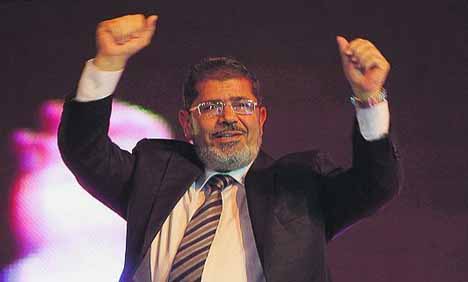
President Mohamed Morsi took his oath of office in front of the general assembly of the Supreme Constitutional Court (SCC), officially becoming the fifth president of Egypt and the first civilian to hold the post.
Morsi reaffirmed his respect for the judiciary in a short speech he gave after the oath, vowing to ensure the independence of the judicial and legislative branches from each other as well as from the executive.
The presidential oath is usually performed in front of parliament, but a decision to dissolve its lower house by the country’s ruling generals after a SCC decision forced Morsi to swear in front of the court’s general assembly instead, as per a constitutional decree released by the military.
Many activists and revolutionary forces, as well as Morsi’s own group, the Muslim Brotherhood, had called on Morsi to reject the idea of taking the oath in front of the SCC as it would be an implicit validation of the court decision to dissolve the People’s Assembly as well as the SCAF constitutional decree, which limits his presidential powers.
The president addressed crowds in Tahrir Square yesterday where he also took the oath in front of hundreds of thousands protesting the Supreme Council of Armed Forces’ decree.
He reaffirmed that he would not agree to any limit of his presidential powers and vowed to allow no one but an elected authority to govern Egypt, in a reference to the SCAF controversial decree.
The Tahrir address pleased many, but others saw it as a compromise since Morsi would still take the oath in front of the SCC anyway. Today, the April 6 Youth Movement among other groups will be adding their pressure to the debate by protesting Morsi’s decision, which they view as a tacit acceptance of SCAF’s decree.
Morsi is currently at Cairo University about to address the nation as president for the first time. He is expected to take the oath again in front of attending parliamentarians in the audience.




